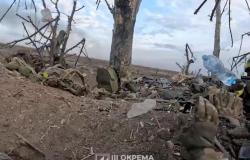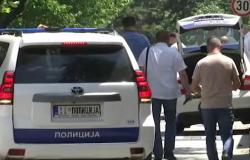Russians are believed to be responsible for the Kharkiv forest fire – Ukrainian emergency service
The retaliation took place at night, as always when Moscow wants to send a message. One hundred missiles and drones over the whole of Ukraine, to say that the response to the use of NATO weapons on Russian territory will be without discounts. And while it threatens to resort to mysterious latest generation arsenals, on the battlefield it resorts to archaic means. Hectares of forest are burning in the Kharkiv region. «An area of more than 3,700 hectares of forest is covered by fire. Most of the fires – reports the State Emergency Service – were caused by Russians. So far it has been possible to locate six fires set out out of nine in progress.”
The Russian Defense Ministry said it had inflicted “retaliation with high-precision weapons” on Ukraine’s energy facilities, “operating for its military industrial complex, and had struck “Western weapons depots.” Among these is one of the military airports where F-16 fighters are expected, information that Kiev denies, implying that the fighter planes supplied by NATO countries will instead use underground bases and improvised runways. Ukrainian air defense, according to official sources in Kiev, shot down 35 of 53 Russian missiles and 46 of 47 drones. Since March, Russia has stepped up its bombing of Ukraine’s electricity infrastructure, knocking out most of its thermal and hydroelectric power generation, causing blackouts and pushing electricity imports to record levels. “Dtek”, the largest private Ukrainian electricity distribution company, also confirmed that two thermal power plants were hit and were “seriously damaged”.
The Kremlin’s official narrative after two years of aggression on urban centers continues to exclude having hit civilian targets. And even in the face of evidence, the Kremlin does not even make timid admissions. Cities once again reduced to darkness (from yesterday at 6pm blackouts of six hours a day are expected), and running water rationed in many regions because the suction pumps in the rivers are running out of energy. After that of the front-line soldier, these days there are two other most dangerous professions in Ukraine: the firefighter and the excavator operator. The former because they have to put out the flames set in the Kharkiv forest by Russian incendiary bombs. They rush ahead without weapons on their shoulders, hoping that behind the blanket there are no explosive traps or machine gun sights. Behind them, the workers of the civil construction companies called to build the fortifications. They sink their shovels into the land where there has been fighting and explosives and poisons still lie there, while the large caterpillars try to make furrows deep enough to slow down the advance of Moscow’s tanks. That it happens two years after the war raises questions and disappointment for many. “The contracts for the supply of wood for fortifications in the Kharkiv region, worth 366 million hryvnia (over 8 million euros), raise considerable concerns,” says Martyna Bohuslavets, head of the Mezha Anti-Corruption Center. In a report yet to be updated it is noted that of the contracts for the supply of wood worth over 400 million hryvnia (over 9 million euros), only 100 million (2 million euros) were signed with forestry companies. The rest of the supply would be entrusted to six companies with unclear outlines, some of which were founded not many months ago.
«Whether it is unclear operations or legal and transparent contracts, little changes for us who are fighting – complains Ruslan, who in the most bombed district of Kharkiv explains to us how his unit of volunteers who fly drones right up to the front lines operates Russian –: to spy or to strike, depending on the orders.” Passionate about Neapolitan coffee, Ruslan openly complains while sipping a cup: «What were they waiting for to build the fortifications? The Russian border is just a stone’s throw away, and were the “great strategists” of the armed forces and the regional administration perhaps waiting for Moscow to come and take Kharkiv? We are preventing it, but at what cost?”.
It is proof of a widespread discontent that the Zelensky administration is dealing with. The continuous dismissals of public officials and corruption investigations reveal endemic malpractice. When we ask Ruslan whether it would not be better, at this point, to negotiate with Moscow by ceding pieces of territory rather than risk conceding more land, the answer is almost irritated: “Putin must be fought, he must not be supported.”
In Kherson, cut in half by the Dnipro which turns towards the delta on the Crimean peninsula, the most dangerous place is “the sniper’s bank”. Russian snipers can break through bulletproof vests with a single shot by shooting from more than a kilometer. You can escape the 14 centimeter projectile, but not the fragments of the Grad rockets and the mortar fire. Olexander Korniakov, known to all as Sasha, is the photojournalist that the Russians wanted to throw during the occupation into the torture chambers in the city center, where during the months of occupation everyone could hear the screams of the unfortunates whose congealed blood remains on the walls. Sasha was wanted for having photographed the entry of the occupation forces, at the exact moment in which the people of Kherson approached the Russian soldiers giving them flowers accompanied by a polite request: “Go back, Kherson is Ukrainian”. Sasha was there with his camera when the commander gave the order to decline the invitation by shooting at eye level. Then the occupation began. The Russians never really left. Positioned behind the opposite embankment, they continue to strike, favoring civilian targets. Firing mortars into neighborhoods is not the same as aiming shots through enemy lines on the battlefield. It means killing and terrorizing those who live there. «The people of Kherson have experienced the occupation, thousands are displaced, but they continue to return – says Sasha who doesn’t take off his bulletproof vest even inside a café on the main street, which has been bombed again –. Some because they are tired of living as refugees, some because they want to try to resist by returning home.”
In the hospital that never closed, not even when the Chechen soldiers threatened the doctors, they celebrated 13 times in the month of May: seven girls and 6 boys were born. And there is nothing else to add to explain what those who live without even counting how many times the mortar knocks hope for.





